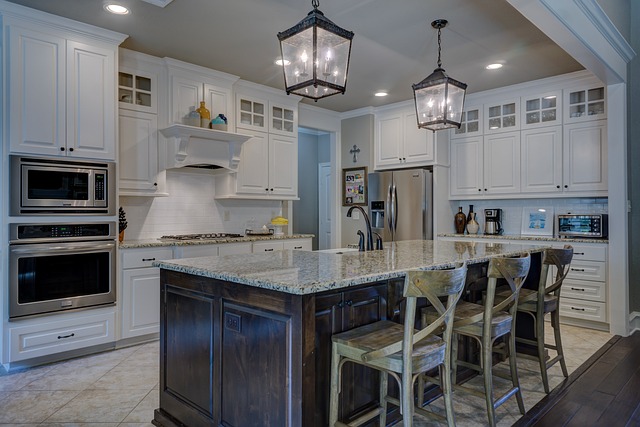Design Innovations and Sustainable Materials for Modern Kitchens
Transforming your kitchen into a functional and stylish space requires careful planning and an understanding of current design trends. From innovative layouts to sustainable materials, modern kitchen design offers homeowners countless opportunities to create a space that balances aesthetics with practicality. This guide explores the latest innovations, materials, and eco-conscious approaches shaping kitchens in 2025.

The kitchen has transformed from a purely functional space into the heart of the modern home, where design innovation meets environmental responsibility. Contemporary kitchen design prioritises both aesthetic appeal and practical functionality, while increasingly incorporating sustainable materials and energy-efficient solutions that benefit both homeowners and the planet.
What Are the Latest Kitchen Design Innovations?
Current kitchen design innovations focus heavily on smart technology integration and space optimisation. Induction cooktops with precise temperature control have become increasingly popular, offering energy efficiency and safety benefits. Hidden storage solutions, including pull-out pantries and corner carousel systems, maximise space utilisation in even the smallest kitchens. Multi-functional islands serve as cooking stations, dining areas, and storage hubs, while integrated charging stations keep devices powered and organised.
Smart home technology has revolutionised kitchen functionality, with voice-controlled lighting, automated faucets, and app-controlled appliances becoming standard features. Under-cabinet LED lighting systems provide task lighting while reducing energy consumption, and motion-sensor technology ensures lights activate only when needed.
Which Modern Kitchen Materials Are Trending in 2025?
Sustainable materials dominate current kitchen trends, with recycled and renewable options gaining significant popularity. Bamboo cabinetry offers durability and rapid renewability, while recycled glass countertops provide unique aesthetic appeal with environmental benefits. Reclaimed wood elements add character while reducing waste, and cork flooring delivers comfort and antimicrobial properties.
Quartz engineered surfaces continue trending due to their durability and low maintenance requirements. Stainless steel remains popular for its hygienic properties and recyclability, while concrete countertops offer customisation options and longevity. Natural stone alternatives made from recycled materials provide luxury aesthetics without environmental compromise.
How Can You Create a Functional and Eco-Friendly Kitchen?
Creating an eco-friendly kitchen involves selecting energy-efficient appliances, sustainable materials, and water-saving fixtures. Energy Star-rated appliances reduce electricity consumption significantly, while LED lighting systems use up to 75% less energy than traditional bulbs. Low-flow faucets and water-efficient dishwashers minimise water usage without compromising functionality.
Composting systems integrated into kitchen design reduce waste while creating nutrient-rich soil amendments. Recycling stations with multiple compartments encourage proper waste separation, and reusable storage solutions eliminate single-use packaging needs. Natural ventilation systems reduce reliance on mechanical ventilation, improving air quality while saving energy.
What Should You Consider When Planning Your Kitchen Updates?
Successful kitchen updates require careful consideration of workflow, storage needs, and future requirements. The kitchen work triangle concept ensures efficient movement between sink, stove, and refrigerator, while adequate counter space accommodates food preparation activities. Electrical requirements must accommodate modern appliances and charging needs, with sufficient outlets positioned strategically throughout the space.
Budget allocation should prioritise high-impact improvements that enhance both functionality and value. Professional consultation helps identify structural limitations and opportunities, while permit requirements vary depending on renovation scope. Timeline planning accounts for delivery schedules, installation sequences, and potential disruptions to daily routines.
| Kitchen Update Category | Estimated Cost Range | Key Considerations |
|---|---|---|
| Cabinet Refacing | £3,000 - £8,000 | Maintains existing layout, reduces waste |
| Countertop Replacement | £1,500 - £5,000 | Material choice impacts durability and maintenance |
| Appliance Upgrades | £2,000 - £10,000 | Energy efficiency ratings affect long-term costs |
| Flooring Installation | £1,000 - £4,000 | Consider moisture resistance and comfort |
| Complete Renovation | £15,000 - £40,000 | Includes structural changes and professional installation |
Prices, rates, or cost estimates mentioned in this article are based on the latest available information but may change over time. Independent research is advised before making financial decisions.
How Do Design Choices Impact Kitchen Functionality?
Design choices significantly influence daily kitchen functionality and user experience. Open shelving creates visual spaciousness but requires organised maintenance, while closed cabinetry conceals clutter but may feel restrictive. Island placement affects traffic flow and workspace efficiency, with proper sizing ensuring comfortable movement around the kitchen perimeter.
Colour schemes impact perceived space size and lighting requirements, with lighter tones reflecting natural light and darker colours creating intimate atmospheres. Material selections affect maintenance requirements, with some surfaces requiring regular sealing while others offer virtually maintenance-free performance. Hardware choices influence accessibility and ergonomics, particularly important for users with mobility considerations.
Modern kitchen design successfully balances innovation with sustainability, creating spaces that serve contemporary lifestyles while respecting environmental concerns. Thoughtful material selection, efficient layout planning, and strategic technology integration result in kitchens that enhance daily life while supporting long-term sustainability goals. These design principles ensure kitchens remain functional, beautiful, and environmentally responsible for years to come.




